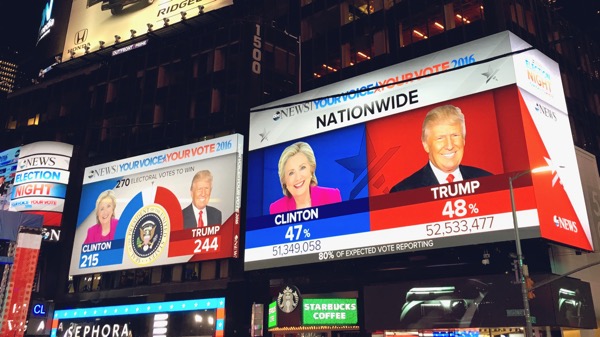
On the eve of the 2020 US presidential election, the most significant in my lifetime, there seems to be a glaring absence in the narrative.
This is, we’re constantly told, a pivotal battle for the soul of America – a fork in the road with two possible paths, one towards continued democracy, the other towards accelerating authoritarianism.
The characters in this morality play are clearly drawn. Joe Biden gives a consistently solid if unspectacular performance as the personification of decency – a man whose own personal losses have burnished his empathy and concern for others.
On the other side is Donald Trump, a man whose narcissism is so absurd, his misogyny so vile, his racism so sickening, his utter absence of empathy so monstrous, that he appears from most angles to have more in common with cartoon villains than with real, living and breathing humans.
History books will tell extraordinary stories about the Mad President for centuries to come, and future Americans will struggle to believe that the country succumbed to Trump’s tawdry demagoguery, his vulgar autocratic outbursts.
The personality of a Trumpist
But for all the stories we are being told, I find it curious that we don’t really get a picture of what that succumbing actually looks like. Who, really, has fallen for Trump?
What the story of this election seems to elide is the personality of the people who are drawn to him – the Trump supporters of every stripe, from the devoted Trump cultist to the more casual Trump voter. The narrative seems to be shirking this important aspect of the story.
Of course, we’ve had years of vaguely condescending journalistic expeditions into Trump’s supposed heartland, interviewing those mythologised white working class voters, unpacking their “economic anxiety” and growing disillusionment with the elusive American Dream. The entire genre basically serves to justify their grievance as a reaction to their withering economic prospects in a globalised economy.
But very few of these portraits acknowledge the GOP-like elephant in the room – Trump followers are to be found across every socio-economic group in every county, town and city across the country.
A toxic combination
No, what defines Trump supporters is not their “economic anxiety”, but something altogether baser, more crude and more universal – Trump supporters, let’s be blunt, overwhelmingly possess some combination of ignorance, bigotry or cruelty.
It’s understandable that the US media isn’t in a hurry to describe millions of Trump supporters in such uncompromising terms, and it’s pretty uncomfortable for me to write those words. But at this point, this far into the Trump era, it’s important to face the full reality of America’s predicament.
Of course, Trump himself exudes all those qualities – he is a bilious, raging mix of ignorance, bigotry and cruelty, and he’s not remotely ashamed by any of it.
The ignorance is evident in the easy dismissal of facts and science. The bigotry is evident in the systematic mistreatment of minorities and immigrants. The cruelty is evident in the vitriolic, often violent discourse and intentionally callous policies.
Endorsing ignorance
To vote for Donald Trump, then, to support Trump against the avuncular Biden, is to endorse these toxic characteristics.
But I believe it goes further than mere endorsement – the evident pride Trump takes in his ignorance, bigotry and cruelty at some level gives his devoted followers a permission structure in which they can revel in their own ignorance, bigotry and cruelty.
Impulses that Trump supporters have long been made to feel guilty for are suddenly something to be celebrated – “owning the libs” is a way of punching back against those cultural and societal forces that have made them feel shame. Trump’s shamelessness feels contagious, and empowering.
Grievance and ressentiment
The psychological concept of “ressentiment”, popularised by Kierkegaard and Nietzsche, is an important one to understand in this context – as Wikipedia summarises it, “ressentiment is a sense of hostility directed toward an object that one identifies as the cause of one’s frustration”. Sounds familiar.
There’s been a lot of fascinating work done on the rise of polarisation in the US, and it’s undoubtedly a complex political reality with many overlapping causes, but it does seem that half the US electorate is animated by ressentiment directed at the other half. My sense is that a large number of them have spent decades feeling subconsciously inferior to the liberals and progressives — perfect conditions for Trump to ignite a raging inferno of ressentiment.
Thus we witness a widespread disdain towards expertise and education (a challenge to ignorance), a reflexive opposition to the Black Lives Matter movement (a challenge to bigotry), an irate fixation on “political correctness” (a mode of discourse that challenges casual cruelty), and so on.
The “coastal elites”, in particular in the form of the Democrats, represent the source of their shame, and Trump represents their liberation from it. No wonder they love him so much.
Universal qualities
This combination of toxic characteristics cuts across his range of supporters. They are not all ignorant, one could argue, but they don’t see ignorance as disqualifying. They are not all bigoted, perhaps, but they evidently don’t feel bigotry is unacceptable in their leaders. They are not all cruel in their own behaviour, necessarily, but they all accept cruelty as a political tool.
Ultimately, these personality traits are of a type with the authoritarian mindset – the tendency to be submissive to in-group authority figures and hostile to out-group non-adherents. Broadly, civilisation and democracy work to dampen the influence of ignorance, bigotry and cruelty, whereas authoritarianism springs from those qualities, and depends on them to spread.
It hardly needs saying that ignorant, bigoted and cruel people are not unique to Trump supporters in the USA – such people exist in great numbers everywhere, unfortunately.
Ignorance, bigotry and cruelty are not intrinsic to conservatism – but the global drift of the right in that direction, from Bolsonaro to Johnson, from Erdogan to Orban, is too consistent to be dismissed as an unfortunate coincidence. They are also evident in elements on the left, of course, but they are certainly not defining traits of the mainstream political or cultural left.
The ignorance within
Indeed, we must acknowledge that these traits exist in all of us, to some extent. Hopefully, for most of us, most of the time, the angels of our better nature suppress those instincts.
But large numbers of people either can’t or don’t want to make that effort – they want to revel in their ignorance, bigotry and cruelty, and they resent social pressure to do otherwise.
How many such people can a healthy society accommodate? What toxic concentration in a population is too toxic for that society to endure? What happens when knowledge, tolerance and kindness is overwhelmed?
I’m afraid we’re about to find out – maybe not on election day, but over the coming months and years, I fear we will discover what percentage of ignorance, bigotry and cruelty in a country is too high a concentration for the centre to hold.

 To what degree can referendums not just measure the national character, but shape it?
To what degree can referendums not just measure the national character, but shape it?